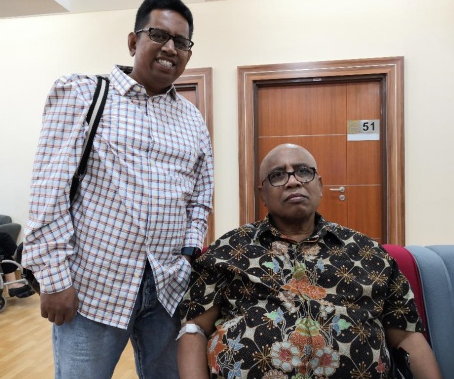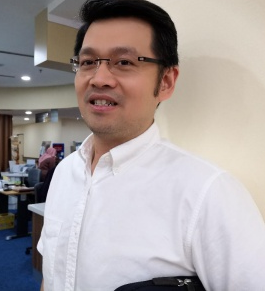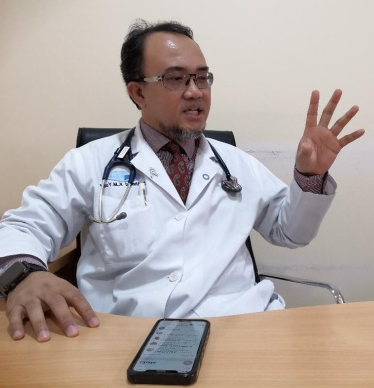IJN Expertise, Facilities Luring Medical Tourists

By Erda Khursyiah Basir
KUALA LUMPUR (Bernama) -- Since 2010, Ilyas Kaoy Hasan has successfully undergone a heart bypass surgery and two angioplasty procedures at the National Heart Institute (IJN).
To date, the 65-year-old businessman from Jakarta, Indonesia, has been making regular visits to IJN for his follow-up treatment and check-ups.
"Right from the start, I felt at home here because of the good service. I've been coming here for treatment for almost 10 years now and I'm satisfied with the service. It's not crowded here and most importantly, the charges are not that steep," he told Bernama when met at the waiting room of IJN's private clinic here, recently.
He was there for follow-up treatment and was, as usual, accompanied by his eldest son Indra Gunawan Ilyas Kaoy, 43, also a businessman.
Ilyas Kaoy is among the increasing number of foreigners who are seeking medical treatment at private hospitals in Malaysia which, according to the Medical Healthcare Travel Council (MHTC), ranks among the best providers of healthcare services in Southeast Asia.

Paul Wibowo Hartono, a businessman from Surabaya in East Java, Indonesia rated IJN's services as good and comprehensive. --fotoBERNAMA(2019) COPYRIGHTS RESERVED
IJN's expertise in cardiovascular and thoracic care is internationally recognised and in November 2009, it was accredited by the Joint Commission International (JCI), a world-renowned authority in health care whose accreditation is considered the gold standard in global healthcare.
The institute was accredited by the Malaysian Society for Quality in Health in November 2005. This accreditation emphasises safety and continuous quality improvement to healthcare facilities and services in compliance with Malaysian standards.
Indra Gunawan said his father's doctor in Indonesia had advised him to seek treatment for his heart problems at IJN.
"He (doctor) told us IJN's services, equipment and facilities were all good and that it has competent specialists and its charges were also reasonable," he said, adding that IJN was the first hospital where his father had sought treatment for his heart disease and everything went well for him.
Now all Ilyas Kaoy has to do is to take care of his health and come to IJN for his follow-up visits once every six months.
SIMILARITIES
Among the factors that drew Ilyas Kaoy to Malaysia to seek treatment were the similarities in the way of life, language, customs and culture among the people of both nations.
Indra Gunawan said they usually stayed at a hotel near the Petronas Twin Towers and that food was not a problem as Indonesian and Malay cuisines were almost similar,
"But, personally, I like the 'mamak' restaurants that are open 24 hours," he added, smiling.
Also awaiting his turn to see the doctor at the waiting room in IJN was Paul Wibowo Hartono, 39, a businessman from Surabaya in East Java, Indonesia.
He said it was his first visit to the renowned hospital and he was there for a cardiac check-up.
"It was my father-in-law who recommended IJN to me as he himself has come here for an examination," he said.
Rating IJN's services as good and comprehensive, he said the staff on duty were also efficient.

IJN's consultant cardiologist Datuk Dr Ahmad Khairuddin Mohamed Yusof --fotoBERNAMA(2019) COPYRIGHTS RESERVED
IJN TOP CHOICE
Asked to comment on why IJN was the top pick of medical travellers, its consultant cardiologist Datuk Dr Ahmad Khairuddin Mohamed Yusof said the IJN brand itself could be the main reason for their confidence in the facility.
"There are other medical centres in Singapore, Johor and Melaka offering the same services (as IJN). They (patients) are, perhaps, taking into consideration our more competitive prices, strategic location in the middle of the city and hospitality," he said.
IJN has an International Patient Centre (IPC) to facilitate preparations for its foreign patients, who are offered the same types of treatments as their Malaysian counterparts.
In 2018, a total of 1,564 foreign patients received treatment at IJN under the outpatient category and up to June this year, the number of such patients totalled 672.
Meanwhile, in 2018 a total of 246 were warded at IJN and up to June this year, 140.
Besides Indonesia, IJN also received patients from Brunei, Laos, Myanmar, Vietnam, Bangladesh, India, Somalia, China, Oman, South Korea, Iran, Australia, Iraq, Sudan, Saudi Arabia, Japan, Hong Kong, Denmark, New Zealand, Italy, Senegal, Maldives and France.
Among the services rendered by IPC are assisting patients with hospital admissions and discharges, meeting and greeting them at the airport, and providing airport transfer, interpreter services if needed and support services and arrangements relating to the patient's medical needs.
Being a pioneer in Malaysia's cardiac care sector, IJN is always at the forefront when it comes to the use of the latest medical technologies.
Touching on this, Dr Ahmad Khairuddin said IJN currently offers PET-CT (Positron Emission Tomography-Computed Tomography) imaging for higher resolution and more accurate scans of the heart and other organs in the body.
He said PET-CT can not only detect cardiovascular disease but also dangerous tumours and cancer as its imaging techniques are capable of providing diagnostic accuracy of up to 95 to 98 percent.
"With the availability of PET-CT, IJN is not only a referral centre for cardiovascular diseases but also cancer," he said, adding that IJN's affordable rates for its high-quality treatment benefited all its patients regardless of whether they were local or foreign.
MEDICAL TOURISM DESTINATION
Meanwhile, Patients Beyond Borders -- a US-based group that helps to connect patients to the highest-quality, most affordable healthcare services in the world -- has also given the thumbs up to IJN.
Its chief executive officer Josef Woodman told Bernama in an email interview that he has toured IJN on two occasions and gave the facility top marks for clinical care as well as its services to international patients.
"The facility is JCI-accredited and is, moreover, a full-service speciality hospital dedicated to heart work," he said, adding that his organisation usually recommends JCI-accredited hospitals for patients who required complex medical procedures.
According to Woodman, Malaysia has been able to position itself as a premier destination for health travellers due to geographical, quality, value and multicultural factors.
"The country's location has made it accessible to three billion patients, many of whom are just a six-hour flight away (from Malaysia). It also has excellent clinical infrastructure and benchmarks and is one of the lowest-cost medical travel destinations," he said.
He said Malaysia's multicultural background has also enabled it to provide medical services to Chinese, Middle-Eastern, Indonesian and English-speaking patients.
Woodman said his decision to set up Patients Beyond Borders, which has its office in Chapel Hill, North Carolina in the United States, in 2005 came about after his father had to travel to Mexico to save money on dental care.
It was then he saw a need in the market for a guide to quality, affordable healthcare for the millions of patients who have to endure hefty treatment costs in their own countries.
MEDICAL TRAVELLERS
Malaysia's medical tourism sector, meanwhile, is poised to register higher growth rates, thanks to its hospitals' cutting-edge technology and state-of-the-art facilities in the high-value areas of cardiology, fertility, orthopaedics and cosmetic surgery.
In April, Health Minister Datuk Seri Dr Dzulkefly Ahmad was quoted as saying that Malaysia hoped to generate up to RM1.8 billion in hospital receipts from healthcare tourism this year.
Speaking during the Asia Pacific Healthcare and Medical Tourism Summit 2019, he said last year's revenue from medical tourism amounted to RM1.5 billion.
"Healthcare travel is one of the fastest growing industries, recording double-digit growth compared with the 0.1 percent growth recorded by the tourism industry in 2017," he said.
The number of medical travellers to Malaysia has increased from 643,000 in 2011 to 1.2 million in 2018. The bulk of last year's figure comprised Indonesian patients who numbered 670,000, according to MHTC.
The growth in patient arrivals has led to medical tourism contributing nearly RM3 billion to RM4 billion to the nation's Gross Domestic Product in 2018.
Dr Dzulkefly also said that Malaysia was recognised by the United Nations Development Programme for having a successful healthcare model for developing nations.
Translated by Rema Nambiar
BERNAMA
HealthEdge
EXCLUSIVE

Pet Vaccination, Public Awareness And Surveillance Key Towards Rabies-free Southeast Asia - Experts
KUCHING, Dec 11 (Bernama) -- The goal of making Southeast Asia free from human rabies can be achieved through a total understanding of the disease, how it can be prevented and responsible pet ownership among communities, say experts.
read more ››IN FOCUS

TAVI KAEDAH BAIK PULIH INJAP JANTUNG TANPA PEMBEDAHAN



